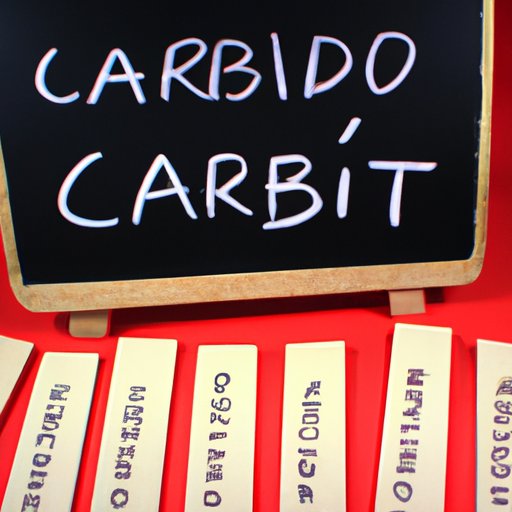
Introduction
Carbs are a vital part of our diet, providing energy for our physical and mental activities. But too many carbs can lead to weight gain and health problems such as diabetes and heart disease. In this article, we explore how many carbs a day to lose weight and provide a comprehensive guide on how to manage your carb intake for optimal weight loss results.
Understanding the basics: What are carbs and why do you need them?
Before we dive into the discussion of carbs and weight loss, it’s important to understand what they are and why they are essential to our diet. Carbs are one of the three macronutrients that provide our bodies with energy, along with proteins and fats. There are two types of carbs: simple carbs and complex carbs. This categorization is based on how quickly the sugars in carbs are broken down and absorbed into our bloodstream. Simple carbs, such as sugars and syrups, break down quickly and are easily absorbed, while complex carbs, such as whole grains and vegetables, are slowly broken down and offer more sustained energy.
How many carbs should you consume per day to lose weight?
When it comes to weight loss, carb intake is a key factor to consider. Generally, a low-carb diet can be effective for weight loss. However, the amount of carbs you should consume per day will depend on your lifestyle, age, gender, and level of physical activity. Another useful concept to understand is “net carbs” which refers to the number of carbs left after subtracting the fiber content. For example, if a food item contains 10 grams of carbs and 5 grams of fiber, its net carb content is 5 grams. For weight loss, it’s generally recommended to stay within 20-100 net carbs per day depending on your goals and dietary preferences.
The impact of carbs on insulin levels: Why it matters for weight loss?
Insulin is a hormone that helps regulate blood sugar levels. When carbs are consumed, they are broken down into glucose or sugar, which enters the bloodstream. In response, the pancreas releases insulin to help move glucose from the bloodstream into the cells where it can be used for energy. However, high carb intake can lead to an overproduction of insulin, which can cause insulin resistance and difficulty in losing weight. To manage insulin levels, it’s recommended to consume carbs with a low glycemic index, such as complex carbs found in whole grains and vegetables.
Low-carbs vs. high-carbs: Which diet plan is right for you?
The debate between low-carb and high-carb diets for weight loss has been ongoing for years. Both approaches have their advantages and disadvantages, and which approach is right for you depends on your individual goals and lifestyle. Low-carb diets focus on limiting or eliminating carbs, whereas high-carb diets emphasize healthy, complex carbs and portion control. Ultimately, the best approach is one that works best for your body and can be sustained over time.
The best carbs for weight loss: Examples of smart food choices?
When it comes to weight loss, not all carbs are created equal. For best results, it’s recommended to consume “good” carbs that are high in fiber, vitamins, and minerals. Examples of smart food choices include whole-grain bread, sweet potatoes, quinoa, and fruits like apples, berries, and oranges. These nutritious carbs provide sustained energy and are important for good health and weight management.
How to cut carbs safely and effectively: Transitioning to a low-carb diet?
Transitioning to a low-carb diet can be challenging and may cause some side effects such as the “keto flu”. However, with proper planning and patience, reducing carb intake can be safe and effective for weight loss. Tips for cutting carbs safely include slowly reducing carb intake, consuming more healthy fats and protein, and staying hydrated. It’s also important to listen to your body and adjust your diet as needed.
Carb cycling: The science behind this weight loss strategy
Carb cycling is another weight loss strategy that involves alternating between high-carb and low-carb days. The idea behind this approach is that the body will burn fat on low-carb days and use the carbs on high-carb days to replenish glycogen stores. Studies have shown that carb cycling may be effective for weight loss, although more research is needed to determine its long-term effects. To implement carb cycling in your diet, it’s recommended to start slowly and work with a nutritionist or healthcare professional to develop a plan tailored to your needs.
Conclusion
Managing carb consumption is an important part of any weight loss program. Understanding how carbs work in the body, the impact of insulin on weight loss, and smart food choices can help you achieve your weight loss goals. Whether you decide to follow a low-carb or high-carb diet, it’s important to listen to your body, make gradual changes, and seek professional guidance when needed.
If you’re looking to reduce your carb intake to lose weight, we encourage you to consult a healthcare professional or nutritionist for personalized advice.




